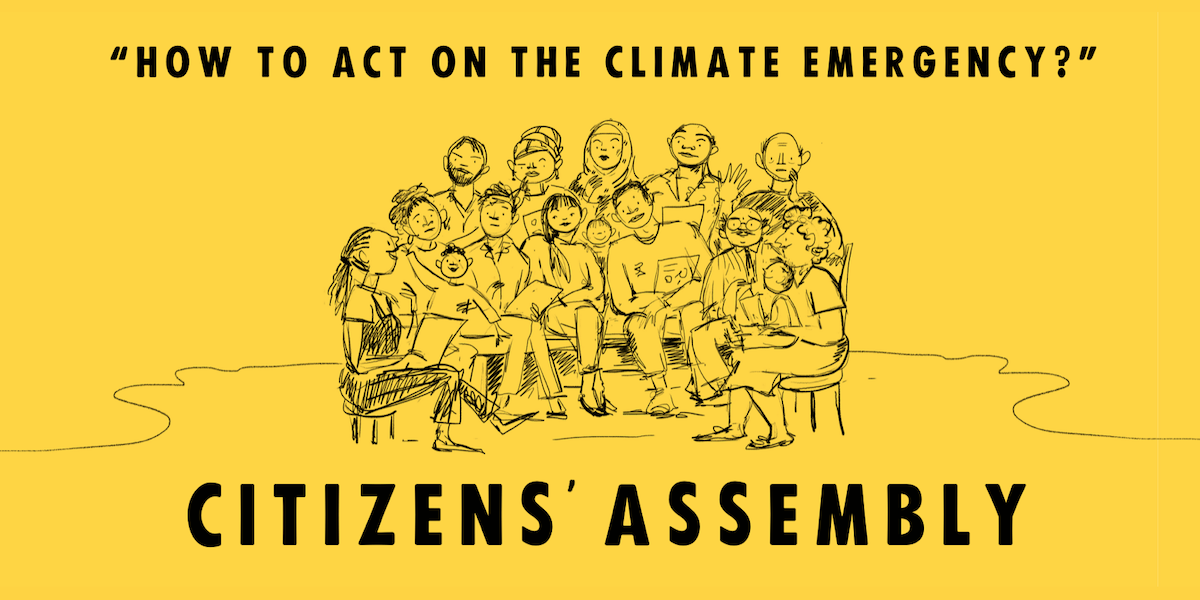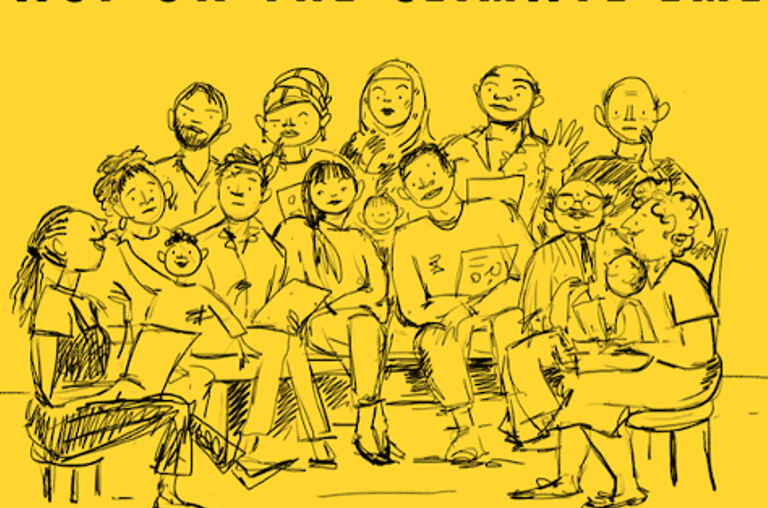‘Extinction Rebellion needs to find ways of reaching the people who think we’re some sort of weird cult.’

This remark, made by a member of the Extinction Rebellion (XR) Citizens’ Assembly Working Group, is met by a spontaneous flurry of jazz hands from everyone in the small Kings College London meeting room. No, we’re not all frustrated musical theatre performers; waving ‘jazz hands’ are used in XR, and other activist groups, to express agreement during a group discussion. I can’t resist pointing out the irony of our reaction – we’re all agreeing we need to be less cult-like by raising our hands in unison and waving them about. Everyone laughs, but it strikes me that this points to a deeper challenge in our work.
There are people who feel excluded by XR’s culture, but the democratic process we want to promote aims at radical inclusion. After all, we’re calling on the government to create and be led by a Citizens’ Assembly on Climate and Ecological Justice – a process that would put national decision-making in the hands of ordinary people from all walks of life. So it seems to me that reaching more people is actually about making a better case for something we are already calling for.
Most people with only a passing acquaintance of XR know that we are calling on the government to firstly declare an emergency, and secondly to halt biodiversity loss and reach net zero emissions by 2025. But many don’t know much about our demand for a Citizens’ Assembly. This is a randomly selected group of people from across the UK who will learn in-depth about the climate and ecological emergency, work through their differences, and determine how we get to net zero greenhouse gas emissions in a socially just way.
Perhaps the most well-known examples of Citizens’ Assemblies are those that took place in Ireland in recent years. They paved the way for long-overdue reforms on topics such as abortion, gay marriage and even climate change. But there is also a large-scale assembly on climate with unprecedented powers taking place in France right now – initiated by President Macron in the wake of the Yellow Vest protests. In fact, there’s been a global groundswell of interest around deliberative democracy over the past couple of decades. From Australia to Poland, groups of randomly selected residents have been helping determine policy for years.
Democracy beyond the ballot box
Academics, activists and even some politicians are cottoning on to the idea that democracy doesn’t have to stop at the ballot box. But they face an uphill struggle in convincing the wider population. A 2018 Pew Center survey conducted across 27 countries found that 51 per cent of people were dissatisfied with how democracy was working in their country. People still firmly believe in the idea of democracy – the trouble is, we usually have quite a narrow experience of what that can mean in practice. For most, it starts and ends with elections.
We’re trapped: we don’t like the system we currently have, but we have trouble imagining anything beyond it. This is where Citizens’ Assemblies come in; they directly address some of the limitations of electoral politics.
Although we call it representative democracy, our parliament is far from representative demographically. Only 34 per cent of MPs are women, as opposed to 51 per cent in the population at large. For ethnic minorities, the figures are 10 per cent and 16 percent respectively. What’s more, elections incentivise politicians to focus on issues that will help them get re-elected. This means thorny decisions in areas such as climate change are more likely to be kicked into the long grass.
Finally, the two-sided British Parliamentary style has such a hold over our imagination that we have come to see adversarial debate as the only legitimate way of reaching decisions. All too often we see the discussion move away from substance and descend into party-political point scoring and personal jibes.
Citizens’ Assemblies use random selection and stratified sampling to ensure that the people in the room truly reflect the country we live in. Like politicians, assembly members have access to advice and expertise. But unlike politicians, they don’t have to think about their political career or their allegiance to a particular party. They are free to consider the issues based on their values and their communities.
In this way, Citizens’ Assemblies are able to make difficult judgement calls and provide politicians with a mandate to tackle complex, long-term issues. Lastly, all of the deliberations take place in small, professionally facilitated groups. This is where the magic really happens – where call centre workers talk to CEOs, where an Orkney Island farmer engages with a stay-at-home parent from Oldham. Rather than shouting each other down with rhetorical flourishes, they are encouraged to really listen to one another and find common ground.
The good news is that some MPs are beginning to get on board with the idea. A group of Parliamentary Select Committees have set up Climate Assembly UK, which launched in Birmingham on 24th January. There, 110 participants will deliberate on measures to cut emissions in areas such as transport, agriculture and domestic energy. It looks set to be a well-run assembly, and it’s a great opportunity to showcase deliberative democracy in the UK. But this is a long way from meeting our third demand.
Crucially, this wasn’t commissioned by Government but by backbenchers from the last Parliament (the composition of the Select Committees has changed following the recent general election). So there’s no guarantee that the newly formed committees will take the recommendations of Climate Assembly UK forward. It could end up having no impact on policy at all.
Most concerningly, assembly participants are working to the UK’s current 2050 net zero emissions target, with no scope to adjust it. That timeframe gives us a 50/50 chance of keeping global heating under 1.5 degrees. Beyond that we’re looking at climate catastrophe – unliveable cities, widespread droughts and annual heatwaves. It’s an insane gamble to take on our children’s futures.
People power
XR is already walking the walk on deliberative democracy, for instance through its use of People’s Assemblies. Despite the confusingly similar name, these aren’t the same thing as Citizens’ Assemblies. People’s Assemblies are informal gatherings of self-selected people who make decisions on group actions. Unlike Citizens’ Assemblies, they don’t include a structured learning phase. But they are really effective at tapping into collective wisdom, identifying areas of consensus and generating a sense of ownership. A handful of conventions ensure that every voice is heard. For instance, we use jazz hands to make sure that the person speaking is not drowned out or cut off. And if a person raises their hand and they have not yet spoken, they jump immediately to the front of the queue.
XR is also beginning to use other forms of deliberative democracy, such as randomly selecting members to serve in decision-making bodies. During the recent October Rebellion, for instance, decisions at each of the roadblocks were made by councils whose members were chosen by lot from those camping at the site. But interestingly, even within the organisation, the use of deliberative democracy sometimes meets with resistance.
People can be sceptical of the legitimacy or expertise of randomly selected XR rebels who are nominated to make decisions. This isn’t surprising given our deeply entrenched and conservative understanding of democracy, as well as a tendency to slip into hierarchical thinking – and XR isn’t immune to this. But the evidence overwhelmingly shows that where people are given the space to learn about, investigate and deliberate on a topic – and where they’re genuinely empowered to feed into decisions – they make responsible and informed choices.
It’s time the Government realised this. They need to step up to the plate and commission a Citizens’ Assembly with teeth. It’s what we need to unleash the political will to address the climate and ecological crisis.
Teaser photo credit: Image by Lambeth XR.





